
Pillows and Neck Pain
Neck pain is a highly prevalent musculoskeletal condition. This usually increases in frequency as one ages. In some patients, neck pain can be debilitating, affecting one’s ability to concentrate at work and sleep. Given that people spend about one-third of their lifespans on the bed, a good pillow may be considered a valuable investment by many.
The neck is supported by the cervical spine. The cervical spine is made up of many parts – joints, intervertebral discs, ligaments, nerves and supporting muscles. As such, it is thought that an ideal pillow would maintain the cervical spine in a neutral curve, allowing the muscles and joints to rest optimally. In turn, this would help to reduce neck pain and improve sleep quality.
Choosing a good pillow to reduce neck pain
If you have neck pain and are looking for a new pillow, here are some factors to consider:
1. Pillow Material
The ideal pillow should provide the neck with good and firm support. As such, if you have neck pain, consider purchasing a memory foam or latex pillow. These materials confer better support to the neck, maintain pillow height throughout the night and have been shown to reduce neck pain. In contrast, feather pillows are softer and confer less support for the head and neck, causing strain to structures that make up the neck.
2. Pillow height
A pillow height that is too high or too low can perpetuate neck pain. For most people, the optimal pillow height is 10-12cm. If you can test out a pillow, always do so. If your pillow is too high or too low, this can lead to muscle strain and discomfort.
3. Sleeping position
Most people sleep on their back, side or on in the prone position. If you have neck pain, sleeping on the back and side is recommended as it allows for better spinal alignment. For back sleepers, a rounded pillow helps to support the neck’s natural curve. For side sleepers, with the neck in a neutral position, ensure that your pillow fills the space between the bed and your ears.
Specialised Pillows
Many manufacturers make specialized pillows which claim that they are designed for neck pain. The design differences in these specialized pillows include alteration in the material used (eg. use of water, gels) or shape of the pillow (eg. contoured, rolled).
Despite these claims, there is currently a lack of evidence that suggest that these expensive pillows are better than non-specialized pillows. For this reason, they are neither encouraged nor discouraged. If you do purchase one, be sure to monitor your neck symptoms and make changes to your pillow plan accordingly.




